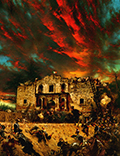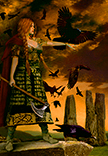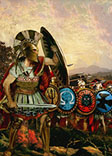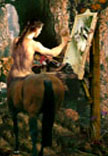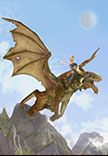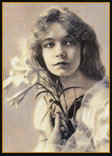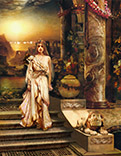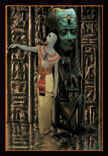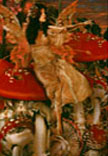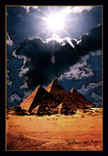

REINER KNIZIA'S RES PUBLICA
AN EDUCATIONAL CARD GAME FOR THE WHOLE FAMILY
Featuring mixed media historical illustrations by Howard David Johnson




In the distant past, people struggled to build civilizations. Gathering together to form cities, they pooled their knowledge to advance their technology. To mark their achievements, they left behind glorious monuments. Players in Res Publica must guide these peoples together to form cities, exchange knowledge and build monuments. The great peoples of antiquity are present, along with their most important innovations and the seven wonders of the ancient world. Three to five players may compete to gather the most advances.
Lead the Babylonians, Egyptians, Greeks, Romans, or the mysterious Atlantians into a bold new future. Will you build a new level of civilization or sink into hopeless barbarism? Find out in Res Publica, the exciting game for players ten and up from master game designer Reiner Knizia. Players trade people cards in hopes of acquiring enough to build a city. Once a city is built, a player draws technology cards and attempts to acquire enough to build a monument representing the advance chosen from the seven wonders of the ancient world. The Player with the most advanced civilization wins.
The Seven Wonders of the Ancient World

The Statue of Zeus
The Statue of Zeus at Olympia in the Peloponnesus was a magnificent example of collossal chryselephantine sculpture. It was made of marble and decorated with ivory and beaten gold. The flesh parts were of ivory and marble layered on a wood or stone core, the drapery and other ornaments of gold adorned with precious stones. The statue of Zeus was made by Phidias, the most famous sculptor of antiquity, who also made the cryselphantine statue of Athena which crowned the Acropolis. The Statue of Zeus was completed in 457 B.C. and placed in the great temple in the sacred grove in Olympia. The Emperor Theodorus I removed it to Constantinople where it was destroyed in a fire in 475 A.D. The statue of Zeus was dedicated to the planet Jupiter.
The Hanging Gardens of Babylon
The Hanging Gardens of Semiramis at Babylon were built by Nebuchadnezzar, the greatest character of Babylonian history to please his wife who had disliked the bareness of her new home. It is certain that he was a great builder; he restored many temples, put up bridges, and lined rivers with embankments. The walls he built around the city of Babylon were the longest, widest, and highest in the ancient world and added by Philo in his list of Seven Wonders. The Hanging Gardens were a series of terraces rising along the Euphates river bank in five tiers of 50 feet each above the next and connected by marble stairways. Each tier was planted with a profusion of fabulous trees, shrubs, and flowers. The gardens were watered by fountains fed through pipes from cisterns in the topmost terrace. Nebuchadnezzar had history's most celebrated gardens developed as an adjuct to his palace; but the Greeks ascribed them to Semiramis; a legendary queen of Babylon, daughter of the goddess Derceto. The Hanging Gardens of Babylon were dedicated to the planet Venus
The Temple of Artemis at Ephesus
The Temple of Artemis (or Diana) at Ephesus, chief of the Ionian cities in Asia Minor, (now called Turkey), was built (circa the fifth-sixth centuries B.C.) by the architect Chersiphron. Once burned down by Herostratus, it was rebuilt even grander, it measured 342 feet by 164 feet and had 127 columns over 60 feet high. It was in this temple that Paul the Apostle preached against pagan worship and aroused angry crowds. The Temple was destroyed by the Goths when they sacked the city in 262 A.D. Fragments of columns from the original temple are in the British Museum.The Temple of Artemis was dedicated to the Moon.
The Mausoleum of Harlicarnassus
When Mausolus, king of Caria (in Asia Minor), died in 353 B.C. his widow Queen Artemisia was determined to commemorate him with the costliest possible memorial. She built a great marble tomb at Harlicarnassus. A fine pyramid with steps of marble surmounted the rectangular base and on top of the pyramid was a mighty sculpture of Mausolus driving an eight horse chariot group. The structure, designed by Pythius and adorned by the sculptures of Scopas and Praxiteles was eventually destroyed by an earthquake before the fifteenth century. The Mausoleum of Harlicarnassus was dedicated to the planet Mars.
The Pharos of Alexandria
The Pharos at Alexandria was a lighthouse at the port of the Egyptian city named for Alexander the Great. It was completed around 300-200 B.C., a skyscraper of the ancient world standing 600 feet high. The summit was an open place, surrounded by bronze columns, where a fire burned at night, fed by wood raised thru the central shaft. The most legendary feature of the Lighthouse of Alexandria was a gigantic mirror which either reflected the sun's rays or the fire by night - up to 150 miles out at sea. Erected in the reign of Ptolemy II Philadelphus on an inlet off the harbor of Alexandria, this lighthouse was the prototype of all similar structures built along the coasts of the Roman Empire. The magnificent edifice was destroyed more than a millennium later by a series of earthquakes. The Lighthouse of Alexandria was dedicated to the planet Saturn.
The Colossus of Rhodes
The Colossus of Rhodes was a gigantic hollow bronze statue of Apollo It was erected around 292-275 B.C. by Chares of Lindus to overlook the harbor of Rhodes. It required twelve years to build but stood only fifty-six years until it was overthrown and broken to pieces by an earthquake in 224 B.C.. The statue stood upward of 105 feet high on an embankment facing the port (not straddling the entrance to the port as was often thought). The legs of the statue were filled with masonry to keep the statue from being top heavy. This and other precautions were unable to save yet another of the ancient wonders from the fury of earthquakes. It lay broken on the rocks for 896 years until Arab conquerors sold it as scrap metal in 672 A.D.. The Colossus of Rhodes was dedicated to the Sun.
The Great Pyramids







At Giza, Egypt, stands the Sphinx, and three famous pyramids, the oldest and largest of which was built by King Khufu (or Cheops) about 3000 B.C. Situated on the Nile's west bank above Cairo it is the largest of more than seventy known Egyptian pyramids measuring 755 feet square at the base and towering more than 481 feet high covering an area of nearly thirteen acres. These enormous monuments were tombs built to protect the Egyptian monarchs and the treasures buried with them. An estimated labor force of over one hundred thousand slaves took more than twenty years to build it. To this day the great pyramids remain the most costliest monuments a man has ever built to himself. Of all the great works of art and architecture that comprised the Seven Wonders of the Ancient World only the Pyramids are still standing.
The Great Pyramid was dedicated to the planet Mercury.



